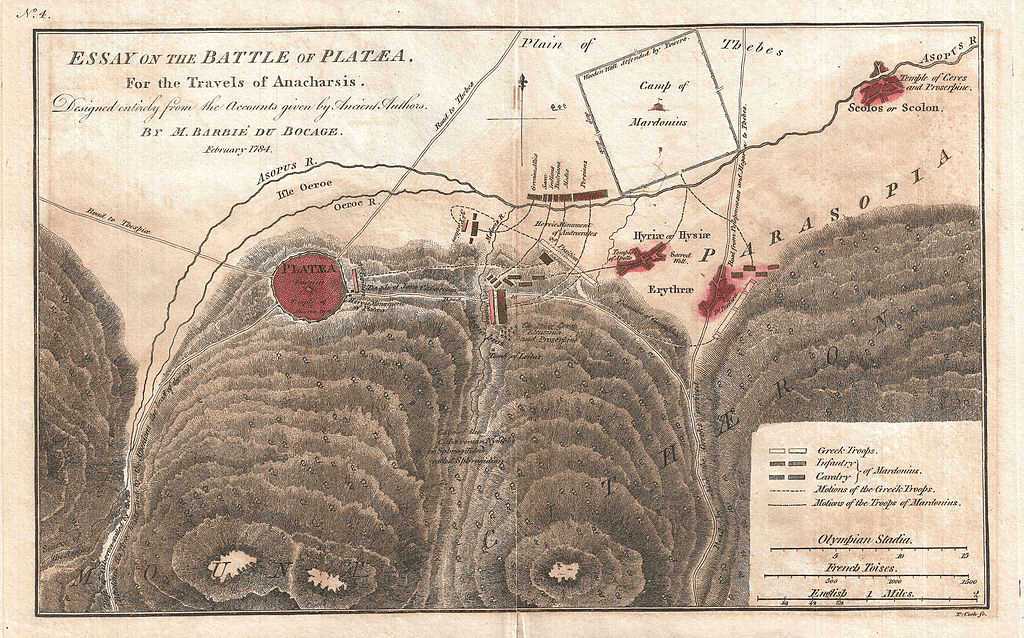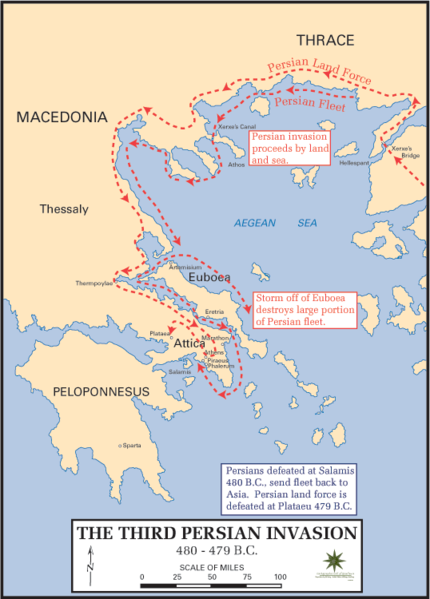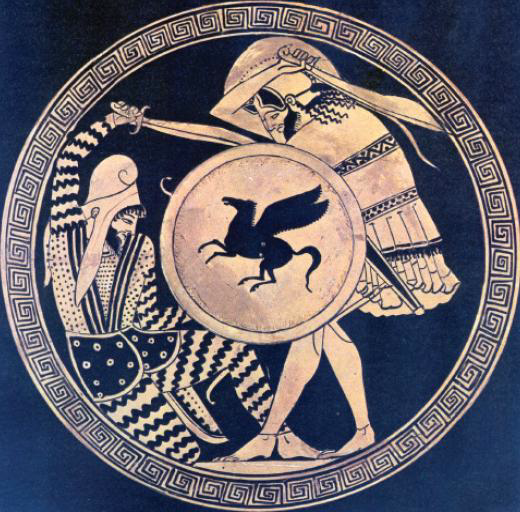Warfare > Battle of Plataea
Battle of Plataea

Background
The Battle of Plataea, fought in 479 BCE, was a decisive engagement during the Greco-Persian Wars. It marked the end of the Persian invasion of Greece and the beginning of Greek dominance in the region. The battle took place near the town of Plataea in Boeotia, involving a coalition of Greek city-states against the Persian Empire led by King Xerxes I.
Background:
Persian Invasion:
- Xerxes' Campaign: In 480 BCE, King Xerxes I of Persia launched a massive invasion of Greece, seeking to subjugate the Greek city-states. This campaign included famous battles such as Thermopylae and Salamis.
- After Salamis: Following the Persian naval defeat at the Battle of Salamis in 480 BCE, Xerxes returned to Asia, leaving his general Mardonius in command of the remaining Persian forces in Greece.
Greek Coalition:
- Formation of the Coalition: The Greek city-states, led by Sparta and Athens, formed a coalition to resist the Persian invasion. Key members included Sparta, Athens, Corinth, Megara, and others.
- Leadership: The Greek forces were commanded by Pausanias, the regent of Sparta, following the death of King Leonidas at Thermopylae.
Prelude to Battle:
Strategic Movements:
- Persian Strategy: Mardonius sought to reassert control over central Greece and aimed to destroy the Greek coalition. He fortified his position in Boeotia, hoping to draw the Greeks into a decisive battle.
- Greek Movements: The Greek coalition assembled a large force and marched north from the Isthmus of Corinth to confront the Persians. They initially took a defensive position near Plataea.
Pre-Battle Maneuvers:
- Skirmishes and Raids: Both sides engaged in skirmishes and raids, attempting to weaken each other's supply lines and morale. The Greeks were cautious, avoiding a direct assault on the fortified Persian position.
The Battle:
Forces and Deployment:
- Greek Army: The Greek coalition assembled approximately 80,000 men, including hoplites and light troops. The Spartan contingent, including 5,000 Spartiates supported by 35,000 helots and other light infantry, formed the core of the Greek army.
- Persian Army: Mardonius commanded around 120,000 men, including Persian infantry, cavalry, and allied contingents from across the Persian Empire.
Initial Engagements:
- Cavalry Actions: The battle began with Persian cavalry harassing the Greek lines. The Greek forces maintained their positions and repelled these attacks, despite facing difficulties in securing their water supply.
Main Battle:
- Greek Advance: The Greeks eventually moved to more favorable ground. During the maneuvering, misunderstandings and lack of coordination temporarily disrupted the Greek formation.
- Final Clash: The decisive phase of the battle saw the Greek hoplites, particularly the Spartans and their allies, engaging the Persian infantry in close combat. The superior discipline and equipment of the Greek hoplites gave them an advantage.
Death of Mardonius:
- Turning Point: Mardonius was killed during the battle, leading to a collapse in Persian morale. The Greek forces capitalized on this, breaking through the Persian lines and routing the enemy.
Aftermath:
Persian Retreat:
- Defeat and Withdrawal: The surviving Persian forces fled northwards, pursued by the Greeks. The defeat at Plataea marked the end of the Persian invasion of mainland Greece.
- Subsequent Actions: The Greeks captured the Persian camp and destroyed the remaining Persian forces in Boeotia. The victory at Plataea effectively ended Persian ambitions in Greece.
Greek Dominance:
- Political and Military Impact: The Battle of Plataea, along with the naval victory at Mycale on the same day or shortly thereafter, secured Greek independence and established Greek dominance in the Aegean Sea.
- Formation of the Delian League: In the aftermath, Athens formed the Delian League, a naval alliance aimed at continuing the fight against Persia and liberating Greek cities under Persian control.
Legacy:
Historical Significance:
- End of the Persian Threat: Plataea was one of the most significant battles in Greek history, ensuring the survival of the independent Greek city-states and marking the decline of Persian influence in the region.
- Symbol of Unity: The battle demonstrated the effectiveness of Greek unity and cooperation against a common enemy, despite the usual rivalries and conflicts between the city-states.
Cultural Impact:
- Commemoration: The victory at Plataea was celebrated in Greek literature, art, and historical writing. Monuments and commemorations, such as the Serpent Column dedicated at Delphi, celebrated the Greek victory.
Military Lessons:
- Tactics and Strategy: The Battle of Plataea showcased the effectiveness of the hoplite phalanx and the importance of discipline and cohesion in battle. It also highlighted the significance of strategic positioning and the ability to adapt to changing battlefield conditions.
Conclusion:
The Battle of Plataea was a decisive and transformative event in ancient Greek history, marking the end of the Persian invasion and securing Greek independence. The unity and bravery of the Greek forces, coupled with effective leadership and tactics, led to a significant victory that shaped the course of Western civilization. The legacy of Plataea continues to be remembered as a symbol of resistance against tyranny and the triumph of freedom and unity.

Battle of Plataea (479 BCE) - Barbie du Bocage (1784)

Persian Invasion Routes (480-479 BCE) - US Military Academy

Greek & Persian Warrior - 5th Century Kylix Natl. Archaeological Museum Athens
Sources
Greek Warfare
- Agema
- Archaic Greek Military
- Athenian Military
- Attic Helmet
- Battle Of Alalia
- Battle Of Amphipolis
- Battle Of Artemisium
- Battle Of Chaeronea 338 BC
- Battle Of Corinth 146 BC
- Battle Of Coronea 394 BC
- Battle Of Cumae
- Battle Of Dyme
- Battle Of Gythium
- Battle Of Leuctra
- Battle Of Lyncestis
- Battle Of Marathon
- Battle Of Mount Lycaeum
- Battle Of Pandosia
- Battle Of Paxos
- Battle Of Plataea
- Battle Of Pteria
- Battle Of Pydna
- Battle Of Salamis
- Battle Of Sardis 498 BC
- Battle Of Sybota
- Battle Of Thermopylae 480 BC
- Battle Of Thymbra
- Boeotian Helmet
- Bosporean Civil War
- Cavalry
- Chalcidian Helmet
- Chiliarch
- Cleomenean War
- Corinthian Helmet
- Corinthian War
- Cretan Archers
- Ekdromoi
- Falcata
- First Sacred War
- Fourth Sacred War
- Greco Illyrian Helmet
- Greco Persian Wars
- Gymnitai
- Helepolis
- Hippeis
- Hoplites
- Hypaspists
- Illyrian Warfare
- Infantry
- Ionian Revolt
- Kopis
- Lelantine War
- Leukaspides
- Makhaira
- Mycenaean Military
- Peloponnesian War
- Peltast
- Phalanx
- Phrourarch
- Phrygian Helmet
- Polemarch
- Prodromoi
- Promachoi
- Psiloi
- Rhodian Slingers
- Rhombus Formation
- Rise Of Macedon
- Sacred Band Of Thebes
- Sacred Wars
- Sarissa
- Second Greco Persian War
- Second Sacred War
- Sicilian Expedition
- Sicilian Wars
- Siege Of Siracena
- Siege Of Syracuse
- Spartan Military
- Strategos
- Taxiarch
- Thasian Rebellion
- Third Sacred War
- Thorakitai
- Thureophoroi
- Toxotai
- Trireme
- Trojan War
- Trophimoi
- War Against Nabis
- Xiphos
- Xyston
